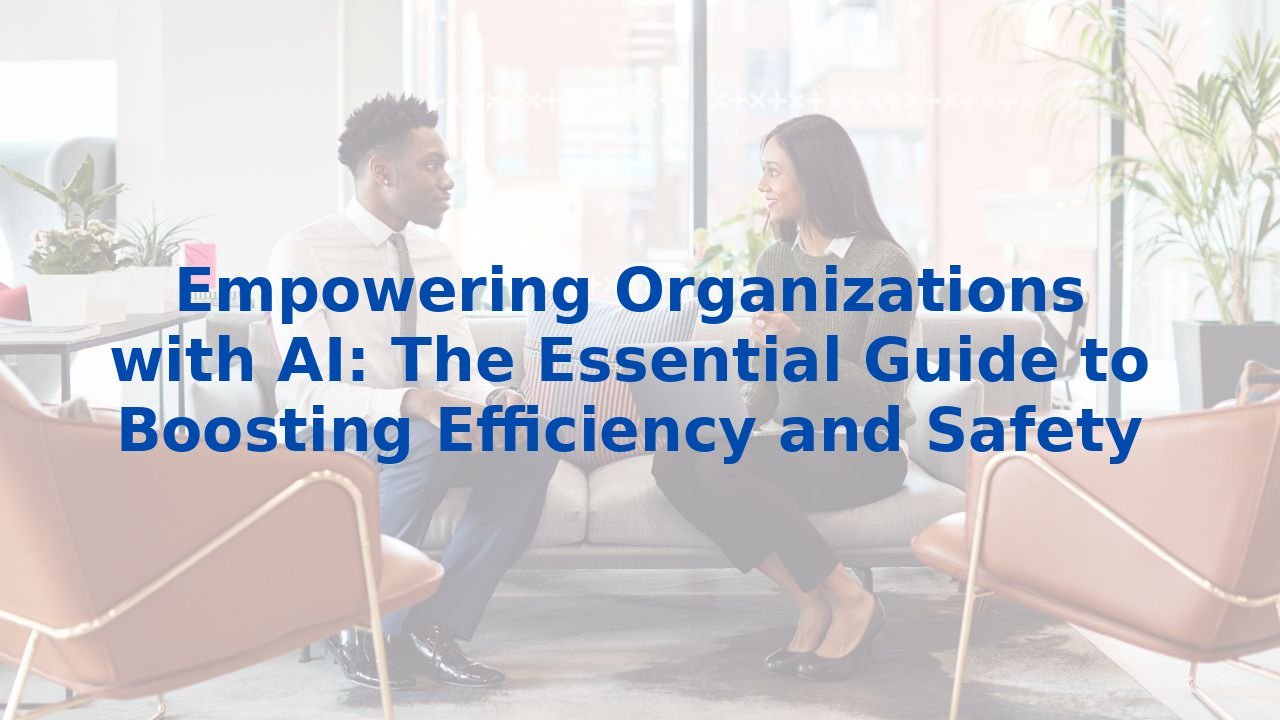Empowering Organizations with AI: The Essential Guide to Boosting Efficiency and Safety
Empowering Organizations with AI: The Essential Guide to Boosting Efficiency and Safety
Introduction
In a world where speed and adaptability define success, organizations are on an unceasing quest to enhance efficiency, bolster safety, and ensure reliability. Enter artificial intelligence (AI) – a groundbreaking catalyst that not only automates operations but also enriches decision-making and operational effectiveness. This post explores how AI revolutionizes business processes, heightens efficiency, and underscores the critical role of employee training in turning AI technology into a company’s most significant asset.
1. Increasing Efficiency
One of AI’s compelling offerings is its capacity to eliminate repetitive tasks from the human workflow. By embracing automation, businesses can redirect their human resources toward intricate, strategic endeavors:
- Customer Service: AI-powered chatbots are transforming customer interactions by managing basic inquiries. They efficiently provide initial support, filter simple requests, and ensure that human agents can concentrate on complex customer issues, resulting in faster and more effective service.
- Supply Chain Management: With AI’s ability to analyze data in real-time, businesses can enhance logistics and inventory management. Predicting demand, managing stock levels, and streamlining operations empower organizations to reduce costs while boosting productivity.
- Administrative Tasks: Automating scheduling, data entry, and other administrative duties allows employees to devote their time to initiatives that drive business growth, enhancing overall productivity and workplace morale.
2. Enhancing Safety
AI extends its value beyond efficiency; it promotes a safer work environment by mitigating human error:
- Fatigue Detection: AI technologies can analyze behavioral data to detect fatigue in employees. In industries such as mining or transportation, preventing fatigue means preventing accidents and ensuring safety, thereby safeguarding both employees and assets.
- Anomalous Health Symptoms: AI systems can monitor employee health metrics and flag potential risks in real-time, allowing organizations to intervene early and reduce workplace incidents significantly.
3. Improving Reliability
Reliability is a cornerstone of operational excellence, and AI shines in enhancing the precision and dependability of business functions:
- Manufacturing: By automating complex tasks and monitoring workflows, AI helps in identifying patterns, predicting disruptions, and troubleshooting issues with machinery in real-time. Predictive maintenance reduces downtime and maximizes equipment efficiency.
- Data Accuracy: AI can rectify errors in data entry and analysis, rendering decision-making processes more precise. Harnessing AI to sift through vast datasets leads to insights that humans might overlook, thereby enhancing strategic decisions.
The Role of Employee Training
While AI is an extraordinary tool, its real power unfurls only when employees are adequately equipped to collaborate with it effectively. Consider the following points:
- Understanding AI Capabilities: It’s vital that organizations invest in training their teams to comprehend AI’s functionalities, limitations, and optimal applications, enabling them to make informed decisions during critical moments.
- Adapting to New Tools: Employees must be comfortable with the new AI-driven technologies being integrated into their workflows. Effective training ensures that teams can leverage tools like chatbots and analytics software efficiently.
- Developing Skills: Focus on building complementary skills – critical thinking, problem-solving, and collaboration become paramount. Training programs shouldn't just focus on using AI but should cultivate an environment where human ingenuity and AI capabilities harmonize.
Conclusion
In summary, AI is a transformative force reshaping the landscape of organizational efficiency, safety, and reliability. By automating tedious workflows, protecting workers from hazards, and boosting accuracy across operations, AI elevates the standard of business practices. Yet, the impact of AI is amplified when organizations prioritize employee training. Investing in comprehensive AI training programs can empower your workforce to harness the strengths of AI, fostering innovation, driving down costs, and enhancing overall performance.
To equip your entire organization with the necessary AI skills, consider exploring the training options available or reach out to understand how to tailor solutions for your unique business needs.



